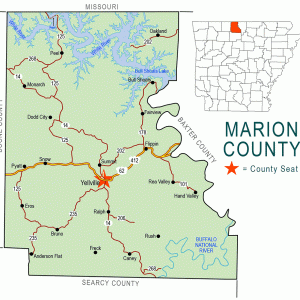calsfoundation@cals.org
Summit (Marion County)
| Latitude and Longitude: | 36°15’08″N 092°41’16″W |
| Elevation: | 860 feet |
| Area: | 1.21 square miles (2020 Census) |
| Population: | 544 (2020 Census) |
| Incorporation Date: | June 2, 1917 |
Historical Population as per the U.S. Census:
|
1810 |
1820 |
1830 |
1840 |
1850 |
1860 |
1870 |
1880 |
1890 |
1900 |
|
– |
– |
– |
– |
– |
– |
– |
– |
– |
– |
|
1910 |
1920 |
1930 |
1940 |
1950 |
1960 |
1970 |
1980 |
1990 |
2000 |
|
– |
– |
122 |
198 |
268 |
239 |
321 |
506 |
480 |
586 |
|
2010 |
2020 |
|
|
|
|
|
|
|
|
|
604 |
544 |
|
|
|
|
|
|
|
|
The city of Summit was built as a result of the construction of the White River Railway. Summit is a suburb of Yellville, the county seat of Marion County, and the two cities are separated by Division Street. Summit’s identity is so much overshadowed by Yellville’s that many people call it North Yellville.
Northern Arkansas was home to various Native American tribes before European explorers and settlers arrived. The land that would become Summit was part of a large area given by treaty to the Cherokee, and the Cherokee at that time were joined by the Shawnee, who built the first houses in what would become the city of Yellville. Eventually, another treaty required the Cherokee and Shawnee to move farther west, and white American settlers displaced them.
Yellville, built on Crooked Creek, grew slowly. The city was heavily damaged during the Civil War but was rebuilt after the war. In the opening years of the twentieth century, Yellville competed with Mountain Home (Baxter County) for a place on a new rail line that would connect Diaz (Jackson County) with Carthage, Missouri. Known as the White River Railway, the planned line was a division of the St. Louis, Iron Mountain and Southern Railway, which was owned by Jay Gould, who also owned the Missouri Pacific Railway. Gould, who was competing with James W. Paramore for rail business, wanted to build a rail line through the Ozark Mountains of northern Arkansas and southern Missouri. The uneven terrain required construction of bridges and tunnels and led to the establishment of several new cities, including Cotter (Baxter County), which was home to a roundhouse for the railroad and the home of many railroad workers.
The rail line and depot were built just to the north of Yellville before the end of 1904. Many other cities in Arkansas relocated their homes and businesses to benefit from rail business, but the citizens of Yellville chose not to move. Instead, a new city was established at the depot. The post office, which opened in 1905, was nearly named Gould—presumably in honor of Jay Gould. Instead, the name Summit was given to the new settlement, apparently because of its elevation, which is higher than that of Yellville. The new city was incorporated in 1917.
A church building was erected in Summit in 1906. At first, it was shared by four congregations—Missionary Baptist, Methodist, Presbyterian, and Christian. Each denomination had a traveling preacher visiting one Sunday every month, but they cooperated with a Union Sunday School. The building was also used as a public school, a meeting house for the city council, and a polling place for voters. Eventually, the property became that of the Baptist church alone, as the Methodist congregation combined with Yellville’s. The Pentecostal Church of God was established in Summit in 1935.
The city also had a bank and a general store. The railroad was used to ship agricultural products, timber, and lead and zinc. Both the timber industry and mining industry declined during the Depression, leading to decreased economic activity for Summit and other Marion County cities. Roads in and out of Summit were not paved until the 1940s. The construction of Bull Shoals Dam, which began in 1947, supplied temporary jobs for area residents. Completion of the dam resulted in Bull Shoals Lake, which has been a tourist attraction ever since, to the benefit of cities such as Summit.
The city of Summit is one of ten associated cities that call themselves the South Shore Communities. Promoting tourism, the cities call attention to the White River and the nearby Buffalo River, as well as Bull Shoals Lake, all of which are highly regarded for fishing, boating, and other recreation. Summit also boasts of its access to Crooked Creek. There are three city parks in Summit and one grocery store. Children in Summit attend schools of the Yellville-Summit School District, all of which are located in Yellville.
Summit was home to writer Richard Sharpe Shaver from about 1965 until his death in 1975. Shaver claimed to have found hidden messages in the mineral formations of agate and other rocks, which he mailed to interested correspondents from the Summit post office.
For additional information:
Adams, Walter M. The White River Railway. North Little Rock, AR: 1991.
Berry, Earl. History of Marion County. Yellville, AR: Historic Genealogical Society of Marion County, Arkansas, 1977, 2002.
Steven Teske
Butler Center for Arkansas Studies
 Marion County Map
Marion County Map 



Comments
No comments on this entry yet.